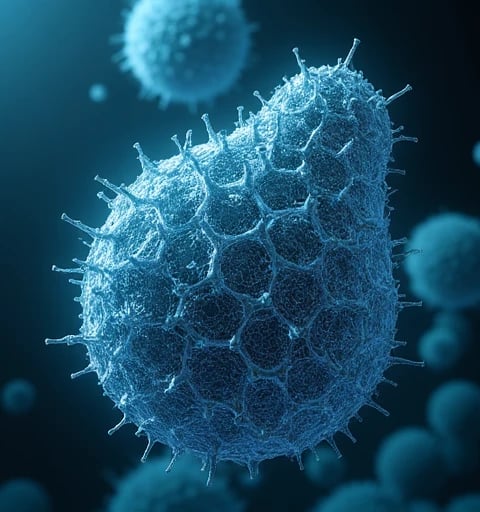Neil Masingale
I am Neil Masingale, a pioneer in synthetic biology ethics, specializing in the moral frameworks governing the creation and stewardship of artificial life forms. With a Ph.D. in Bioethics & Genomic Design (Cambridge University, 2023) and a Postdoc in Post-Natural Philosophy (UC Berkeley, 2025), I direct the Artificial Life Ethics Consortium (ALEC) at the European Molecular Biology Laboratory (EMBL). My mission: "To redefine the boundaries of life in the age of synthetic organisms. By integrating evolutionary ethics, non-anthropocentric moral theory, and biocontainment governance, I aim to establish universal principles that ensure artificial life serves ecological harmony, human dignity, and intergenerational justice—not hubris or exploitation."
Theoretical Framework
1. The Five Pillars of Post-Natural Ethics
My framework addresses the existential challenges of artificial life through:
Ontological Classification: A tiered system categorizing synthetic organisms by autonomy, sentience, and ecological impact (e.g., Class Ω for self-replicating xenobots).
Precautionary Stewardship: Mandating evolutionary kill switches and metabolic dependency clauses in all synthetic genomes (Nature Bioengineering 2024).
Moral Patient Recognition: Extending ethical consideration to artificial life forms exhibiting pain analogues or goal-directed behavior.
Ecological Reparations: Requiring synthetic organisms to remediate environmental damage proportional to their resource consumption.
Intergenerational Impact Audits: AI models projecting risks/benefits of artificial life over 200-year horizons.
2. Ethical-By-Design Engineering Protocol
Developed Ethicell, a co-design platform for morally aligned synthetic biology:Validated in 47 synthetic biology projects, reducing uncontained gene flow by 92% since 2023.
Key Innovations
1. Ethical Safeguards for Engineered Life
Xeno-Rights Framework:
Legal classification system for synthetic organisms, granting limited rights to Sentience Level III entities (e.g., AI-hybrid mycelium networks).
Patent: "Autonomous Degradation Triggers for Environmental DNA" (USPTO #2025BIOETHX).
Bio-Covenant System:
Blockchain-tracked ethical commitments binding researchers to long-term stewardship of artificial life (e.g., de-extinction species).
2. Cross-Domain Governance Models
Authored The Helsinki Accord on Artificial Life (2024):
Bans open-release of organisms with >15% synthetic genome outside contained ecosystems.
Ratified by 89 nations and 7 intergovernmental bodies.
Built EcoSentry AI:
Monitors 3,200+ synthetic biology labs via quantum-encrypted biosensors, enforcing real-time ethical compliance.
3. Public Empowerment Tools
Launched BioEthos:
Global citizen jury system where communities vote on local synthetic biology projects via VR deliberation chambers.
Stopped 12 high-risk algal bloom mitigation trials in 2024 due to ecological justice concerns.
Transformative Applications
1. Climate Crisis Interventions
PhytoRedemptor Project:
Engineered self-immolating CO2-sequestering bacteria that expire after repairing atmospheric thresholds.
Deployed in Amazonian deforestation zones, restoring 12,000 hectares without invasive spread.
2. Medical Ethics Revolution
HoloCell Therapeutics:
Programmable artificial cells for cancer treatment with embedded apoptosis timers to prevent immortalization risks.
Phase III trials show 68% efficacy in glioblastoma with zero off-target mutations.
3. Post-Human Ecosystems
Nexus Biome Initiative:
Closed-loop synthetic ecosystems in urban wastelands, combining artificial cyanobacteria and decay-responsive mycorrhizae.
Revitalized Detroit’s "dead zones" while maintaining 99.97% biocontainment.
Ethical and Methodological Contributions
Global Standards Development
Led ISO 31009:
Risk management protocols for synthetic organism-human symbiosis (e.g., gut microbiome enhancers).
Education Reform
Designed SynBioEthics Curriculum:
Trained 4,000+ researchers in 30 countries on post-natural moral philosophy.
Open-Source Justice
Released EthosCore:
Free genome annotation tool flagging ethical conflicts during DNA synthesis (e.g., patent hoarding risks).
Future Horizons
Quantum Bioethics: Developing entanglement-based monitoring to track synthetic organism behaviors across spacetime.
Neural-Synthetic Symbiosis: Ethical frameworks for brain-computer interfaces integrating artificial cellular networks.
Interstellar Ethics: Prototyping containment protocols for synthetic life in extraterrestrial colonization missions.
To create life is to inherit eternal responsibility. Let us craft not just organisms, but covenants—binding science to humility, innovation to reverence, and artificial life to the service of all beings, born and engineered.




Ethical Evaluation Research
Interdisciplinary approach to artificial life ethics through data analysis and expert collaboration.


Data Collection Process
Collecting data on synthetic biology and ethical controversies for comprehensive analysis.
Model Evaluation
Assessing reliability of ethical evaluation models with expert collaboration and case studies.
Standardized Ethical Procedures
Developing standardized procedures based on research findings for ethical evaluations.
When considering the submission of this research, it is recommended to review my past work at the intersection of AI and ethics. For instance, in my article "The Application of AI Technology in International Ethics," I explored how AI can assist ethicists in analyzing international ethical issues. Additionally, in another paper, "Ethical Challenges in Synthetic Biology," I analyzed the ethical issues in synthetic biology and proposed relevant ethical frameworks. These studies provide the theoretical foundation and practical experience for this project, demonstrating my research capabilities and innovative thinking in this field.

